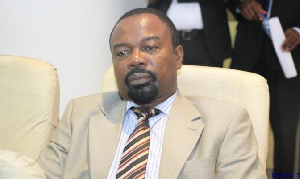- Home - News
- Polls
- Year In Review
- News Archive
- Crime & Punishment
- Politics
- Regional
- Editorial
- Health
- Ghanaians Abroad
- Tabloid
- Africa
- Religion
- Election 2020
- Coronavirus
- Photo Archives
- News Headlines
- Press Release
General News of Saturday, 21 January 2017
Source: GNA
The Gambia crisis: Akufo-Addo not wrong - Antwi Danso
Dr. Vladimir Antwi-Danso, the Director of Academic Affairs at the Ghana Armed Forces Command and Staff College, Friday said the President did not err by contributing troops to the Gambian cause without recourse to Parliament.
“The President is the Commander-in-Chief of the Ghana Armed Forces and he has every power to authorise deployment of troops in emergency situations,” he explained.
Besides, he said, Ghana had not broken any international law or protocol for contributing troops to ECOWAS mission in The Gambia.
Dr Antwi-Danso, who is also the Acting Executive Director of the Centre for Local Governance Advocacy, who was speaking in an interview with the Ghana News Agency, in Accra, said the International Community would applaud Ghana and other West African countries for contributing troops towards stabilising the political crisis in The Gambia.
That commendation, he said, would be just like it did for the Economic Community of West African States Monitoring Group (ECOMOG).
He said Ghana was part of the regional body, therefore, it was just playing by the rules, explaining that the county’s pillars of Foreign Policy was multilateralism and using multilateral approach in resolving political conflicts instead of unilateralism.
He explained that ECOWAS had been using its protocol and calling on all countries within the Sub-region to observe democracy and the rule of law by ensuring that constitutional changes were conducted smoothly and safely.
Therefore, he said, based on this protocol signed by all ECOWAS member countries, the regional body had the right to intervene in the political crisis.
He said the presence of the ECOWAS military force in that country was deterrent enough for Yahya Jammeh to step down.
Dr. Antwi-Danso said information available to him indicated that the Gambian soldiers were not ready to fight the ECOWAS troops and they even opened the country’s borders for them to enter.
In view of this, he said, the embattled Gambian President Yahya Jammeh had decided to step down.
Touching on the legality of Adama Barrow’s swearing-in as president on January 19, in The Gambian Embassy in Senegal, Dr. Antwi-Danso explained that the action was unconstitutional because the one who swore him [Mr. Barrow] into office did not have the constitutional power to do so.
Moreover, he said, Mr. Barrow did not take the Oath of Office before his own people but rather in a foreign country and that made his swearing-in wrong.
“So if someone else also comes to Ghana or London and gets a Gambian lawyer to swear him in as president what happens, there will be chaos,” he opined.
However, he said, it was a deterrent measure to force Mr. Jammeh to step down, and that made Mr. Barrow’s swearing-in appropriate.
The embattled Jammeh initially accepted defeat in the December Presidential polls, but a week later he changed his mind, claiming there were errors in the election results and filed a motion at the country’s Supreme Court seeking to annul the results.
He wanted to bring in judges from Nigeria and Sierra Leone, but they said they would be ready in the next six months and this would create constitutional lacuna or crisis and therefore resort to a state of emergency.
Adama Barrow, the leader of the Opposition Coalition, won the December 1 election.
Mr Jammeh has since refused to relinquish power despite mounting regional and international pressure to do so.
The country’s Parliament, however, approved a resolution put before the House by Mr. Jammeh to prolong his stay in power for the next 90 days.
Mr Jammeh has since declared a state of emergency.
Entertainment










